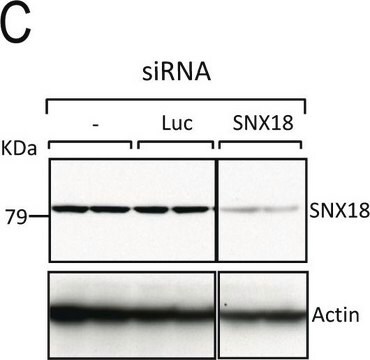ZMS1156
Anti-β Actin Antibody, clone 4C2 ZooMAb® Mouse Monoclonal

recombinant, expressed in HEK 293 cells
Synonim(y):
Actin cytoplasmic 1
About This Item
Polecane produkty
pochodzenie biologiczne
mouse
Poziom jakości
rekombinowane
expressed in HEK 293 cells
białko sprzężone
unconjugated
forma przeciwciała
purified antibody
rodzaj przeciwciała
primary antibodies
klon
4C2, recombinant monoclonal
opis
recombinant, expressed in HEK 293 cells
linia produktu
ZooMAb® learn more
Postać
lyophilized
masa cząsteczkowa
calculated mol wt 41.74 kDa
observed mol wt ~40 kDa
oczyszczone przez
using protein G
reaktywność gatunkowa
monkey, mouse, human, rat
opakowanie
antibody small pack of 25 μL
charakterystyka ekologicznej alternatywy
Waste Prevention
Designing Safer Chemicals
Design for Energy Efficiency
Learn more about the Principles of Green Chemistry.
rozszerzona walidacja
recombinant expression
Learn more about Antibody Enhanced Validation
metody
flow cytometry: suitable
immunohistochemistry: suitable
western blot: suitable
izotyp
IgG1κ
sekwencja epitopowa
N-terminal
numer dostępu Protein ID
numer dostępu UniProt
kategoria ekologicznej alternatywy
Warunki transportu
ambient
temp. przechowywania
2-8°C
informacje o genach
human ... ACTB(60)
Powiązane kategorie
Opis ogólny
Specyficzność
Immunogen
Zastosowanie
Evaluated by Western Blotting in HeLa cell lysate.
Western Blotting Analysis: A 1:10,000 dilution of this antibody detected β Actin in HeLa cell lysate.
Tested Applications
Western Blotting Analysis: A 1:10,000 dilution from a representative lot detected β Actin in Jurkat, COS-7, NIH3T3, and PC12 cell lysates.
Immunohistochemistry (Paraffin) Analysis: A 1:1,000 dilution from a representative lot detected β Actin in human small intestine and human epididymis tissue sections.
Flow Cytometry Analysis: 1 µg from a representative lot detected β Actin in one million HeLa cells.
Note: Actual optimal working dilutions must be determined by end user as specimens, and experimental conditions may vary with the end user.
Opis wartości docelowych
Postać fizyczna
Rekonstytucja
Przechowywanie i stabilność
Inne uwagi
Informacje prawne
Oświadczenie o zrzeczeniu się odpowiedzialności
Not finding the right product?
Try our Narzędzie selektora produktów.
Kod klasy składowania
11 - Combustible Solids
Klasa zagrożenia wodnego (WGK)
WGK 1
Temperatura zapłonu (°F)
Not applicable
Temperatura zapłonu (°C)
Not applicable
Certyfikaty analizy (CoA)
Poszukaj Certyfikaty analizy (CoA), wpisując numer partii/serii produktów. Numery serii i partii można znaleźć na etykiecie produktu po słowach „seria” lub „partia”.
Masz już ten produkt?
Dokumenty związane z niedawno zakupionymi produktami zostały zamieszczone w Bibliotece dokumentów.
Protokoły
Follow this short antibody reconstitution protocol and see how easy it is to reconstitute ZooMAb® recombinant antibodies.
Nasz zespół naukowców ma doświadczenie we wszystkich obszarach badań, w tym w naukach przyrodniczych, materiałoznawstwie, syntezie chemicznej, chromatografii, analityce i wielu innych dziedzinach.
Skontaktuj się z zespołem ds. pomocy technicznej








